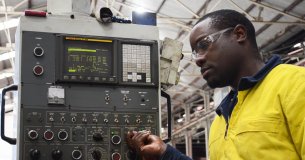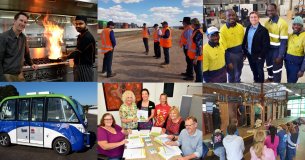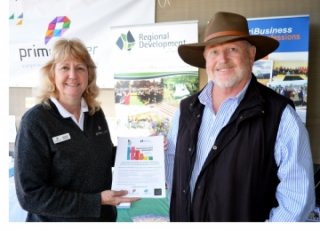-
Featured Items
-
Featured Resources
 Funding & Grants
Don't miss out on funding opportunities. Stay informed with our up to date online listings and email notifications.
Read More
Funding & Grants
Don't miss out on funding opportunities. Stay informed with our up to date online listings and email notifications.
Read More
 Skilled Migration
Our services help both applicants and employers, to learn more, develop plans, submit applications, and settle in.
Read More
Skilled Migration
Our services help both applicants and employers, to learn more, develop plans, submit applications, and settle in.
Read More
 Research and Analysis
Good research and analysis makes the case. How can our resources and services help your project or application?
Read More
Research and Analysis
Good research and analysis makes the case. How can our resources and services help your project or application?
Read More
 Information & Data Resources
With resources like REMPLAN, Regional Knowledge Base, and decades of data, discover how we can help your project.
Read More
Information & Data Resources
With resources like REMPLAN, Regional Knowledge Base, and decades of data, discover how we can help your project.
Read More
-
Stay InformedSubscribe to one or more of our regular email subscriptions, to be kept up to date on news and funding opportunities for the region
-
-
Our Region
- Our Region
- Regional Plan
- Regional Data
- Current Regional Issues
- Population Migration Analysis for 2016-21
- Job Vacancies Continue at All-Time High
- National Debt - What it Means for Our Economy?
- The True Value of Home Solar
- The Economic Impacts of Local Government Amalgamations
- State of the Regions Report 2014-15
- Antifragility - A different take on regional economic development
- Biohubs - Collaborative Waste Management
- Attracting New Residents
- Socio-Economic Impacts of the Murray Darling Basin Plan
- Murray Darling Basin Water Recovery
- Growing Businesses
- The Northern Inland Economy
- Geographical Overview
- Major Industry Sections
- Our Services
- Grants and Funding
-
Skilled Migration
- Skilled Migration
- Skilled Employer Sponsored Regional Visa
- Skilled Work Regional Visa (subclass 491)
- Temporary Seasonal Workers
- Designated Area Migration Agreement (DAMA)
- Helpful Information for Visa Holders
- Information for Employers
- Case Studies
- Payment Details
- Advice & Further Information
- Contact Details
- News & Events
-
Our Projects
- Our Projects
- Current Projects
- Skilled Migration
- Wool Works - Wool Training Schools
- Metal Works - Welding and Fabrication Schools
- Come On Inland
- Stories of Resilience
- Alt Brothers Beekeeping - Glen Innes
- Carelle's Toy Store - Glen Innes
- Greenhill Orchards - Arding
- Gwydir Meats - Warialda
- Kaputar Motors - Narrabri
- Moonbi General Store - Moonbi
- Sandstock - Tingha
- Sherelle Fashions - Tenterfield
- Sleepy Merino - Inverell
- Tenterfield Chamber of Toursim, Industry and Business - Tenterfeild
- The Welders Dog - Armidale
- Walcha Veterinary Supplies - Walcha
- AGCAP - Agribusiness Careers & Professions
- Northern Inland Regional Investment Profile
- Past Projects
- Digital Economy Strategy
- Business Growth Project
- Go Digital
- How to Start an Online Business
- Create Your Website Using Squarespace
- How to Edit Your Squarespace Site - Part 1
- How to Edit Your Squarespace Site Part 2
- Add a Shop to Your Squarespace Site
- Start a Blog and Find out What Customers are Searching
- 14 Tips For a Better Blog Post
- Which Social Media Platforms are Best for Your Business
- How to Use Facebook Effectively For Your Business – Part 1
- How to Use Facebook Effectively For Your Business – Part 2
- Instagram Tips for Business
- Catching Up, More Instagram & Dealing with Haters
- Getting Started with Twitter for Business
- Social Media Scheduling Tools
- How to Start an Etsy Shop – Part 1 – Research
- How to Start an Etsy Shop – Part 2 – Signup
- Online Security for Your Business
- Product Photography and Website Images: Your Guide
- 5 Tips to Improve your Productivity in your Business
- Best Online Business Resources
- How to Improve Your Communication Skills and Win More Clients
- NBN Coordinator
- Putting Power Back in the Regions
- Road Freight Study
- Town Audit Benchmarks
- Food and Wine
- Youth Survey
- Digital TV Switchover Assistance
- Northern Inland Transport Guide
- Live.Train.Work
- Northern Inland Innovation Awards
- Northern Inland Innovation Awards - 2017
- Northern Inland Innovation Awards - 2016
- Northern Inland Innovation Awards - 2015
- Northern Inland Innovation Awards - 2014
- Northern Inland Innovation Awards - 2013
- Northern Inland Innovation Awards - 2012
- Norther Inland Innovation Awards - 2011
- Prime Super Northern Inland Innovation Awards - 2010
- Prime Super Northern Inland Innovation Awards - 2009
- Northern Inland Innovation Awards - 2007
- Northern Lights Project
- NBN Smart Home
- Murray Darling Basin
- Moree Plains Business Workshops
- Namoi Investment Prospectus
- Industrial Land
- Bioenergy and Local Electricity Retailing
- Northern Inland Business Energy Assessment
- Skills for the Future
- Impacts of COVID-19 on Businesses
- Past Projects of NIRDB
- Aboriginal Employment and Enterprise in the Gunnedah Region
- Art as an Industry
- Aviation Survey
- Farm Forestry - Northern Inland Forestry Investment Group
- New England North West Film Strategy
- Northern Inland Excellence in Business Awards
- Food and Wine 2003 - 2008
- Prime Super Northern Inland Innovation Awards 2009
- Regional Business Networking Program
- Regional Leadership Course 2008
- Viticulture Strategy 2002-2003
- About Us
- Contact Us
- Other Resources
- Privacy and Legal
- Search
Back to Newsletters
September 2016 Update
Wednesday 14th of September 2016
In this Issue:
- Time to Promote Your Innovation
- Regional Solar Power Bulk-Buy
- 2015 Regional Wellbeing Survey Data Now Available
Time to Promote Your Innovation
"If you have a product, service, approach or initiative that can be described as innovative, the Northern Inland Innovation Awards is a specialised award program focussing on just that,” said Mr Stewart. “The deadline for entries is just under a month away, so get cracking."
The region-wide awards program is in its 9th year and organisers are proud of the positive stories of outstanding quiet achievers that have been unearthed and publicised to date. “I encourage everyone to get onto the awards website (www.niia.com.au) and check out the videos we have produced of past category winners and finalists, like last year’s Innovation of the Year winner, Lively Linseed of Mullaley.”
Businesses, public and not-for-profit organisations, together with the 12 local councils of the Northern Inland region are being urged to submit entries for the 9th annual (RDANI) Innovation Awards. Entries close on Monday 3rd October, 2016.
"The The Department of Industry, Innovation and Science, Prime Super, the University of New England, Telstra Store Inverell and Inverell Shire Council are supporting these awards in 2016 and I think that is recognition of how important they are.”
“Prime Super is proud to be involved with these awards. I was one of four judges last year and it was great to see such a wide range of entries from people who are justifiably proud of what they have been doing. A little effort to tell your story and make others proud with you can be so worthwhile, particularly in a regional setting,” Prime Super Regional Manager Annette Mackay said.
The NIIA Categories are:
- Agriculture / Horticulture and associated services;
- Health, Aged Care and Disability Services;
- Retail, Tourism & Leisure;
- Professional and Government services;
- Manufacturing and Engineering;
- Research and Education.
Each year the gala Northern Inland Innovation Awards dinner and presentation evening is held in a different Local Government Area within the region. In 2016, these regional Awards will be presented at the Inverell RSM Club on Friday, 18 November. Enter the awards or book for the dinner via the website: www.niia.com.au.
Regional Solar Power Bulk-Buy
Farming the Sun is launching a fourth community bulk-buy of solar power systems project this week. Co-ordinated by local not-for-profit consultancy, Starfish Initiatives, it will build upon earlier success in coordinating the installation of $6.7mil worth of solar technologies during the 2008-2011 period and the creation of Australia’s first ever community-funded and Council-operated solar farms in Lismore. “Farming the Sun’s broader purpose is to significantly increase the understanding, affordability and take-up of solar energy technologies,” Starfish Initiatives’ Liz Gardiner said.
“Farming the Sun provides community members and businesses the opportunity to be a part of a collective purchasing program which aims to achieve a significant discount of 15-18% below recommended retail prices for high-quality, Tier 1, solar power systems ~ supplied by local specialist Eco Energy & Solar Solutions.”
This offer is being made available to residents and businesses throughout the Tamworth, Gunnedah, Liverpool Plains and Southern New England High Country regions.
“Farming the Sun has negotiated this collaboration with Eco Energy & Solar Solutions given their demonstrated track record, being a well-respected local family owned and operated business, and having the capacity to work at the scale of a community bulk-buy program,” Ms Gardiner said.
“The goal is to install 1MW of solar power for 1% (333) of residences. Any business take-up will be in addition to this goal.”
Farming the Sun will further contribute to the long-term sustainability of the New England North West region by way of setting aside “1% for Sustainability” - being 1% of the project income to fund future sustainability initiatives which are aligned with the priorities identified in the New England Sustainability Strategy.
The solar power bulk-buy program is coinciding with several significant developments:
- Electricity prices are being significantly increased (upwards of 10%) for the first time in several years
- Conclusion of the NSW Government Solar Bonus Scheme (feed-in-tariff)
- Small scale technology (renewable energy) certificates will begin to be phased out from 1 January 2017
- Preparedness for small-scale battery storage technology
- Growing community concerns about the environmental impacts of coal mining on water, farming, biodiversity, climate and air quality
- Construction of large-scale wind and solar projects which are the largest capital infrastructure projects in the region's history.
To register interest or find further information, click here.
Member for Tamworth Kevin Anderson will conduct the launch on Monday 19 September 2016, 9:45am for a 10am start to 11am a T1.16 – Binaalbaa, TAFE New England, Janison Street, TAMWORTH.
2015 Regional Wellbeing Survey Data Now Available
Each year, the University of Canberra’s Regional Wellbeing Survey examines the wellbeing, resilience and liveability of rural and regional communities across Australia: in 2015, more than 13,000 people completed the survey.
That regional data from the 2015 Regional Wellbeing Survey can be accessed at www.regionalwellbeing.org.au. You can download more than 100 indicators of wellbeing, resilience and liveability for every region in which we received 100 or more survey responses in 2015. This includes local government areas, Regional Development Australia regions, and natural resource management regions.
The direct link to these results is: www.canberra.edu.au/research/faculty-research-centres/ceraph/regional-wellbeing/survey-results/2015.
“The indicators and conclusions that can be derived from the survey can be very interesting and helpful,” RDA Northern Inland Chair Russell Stewart said. “Our general well-being in Northern Inland NSW rates well on State national levels but our confidence in our economic growth prospects is lower than most of the State,” he said. “It is so important to be positive for economic and social reasons.”
Some of the conclusions of interest to Northern Inland NSW:
Just over half of rural and regional Australians felt that their community’s friendliness (55%), liveability (51%) and local landscape and surrounds (56%) were changing for the better; only 18% to 23% felt each of these were changing for the worse. Queensland residents were more likely than those in other parts of rural and regional Australia to feel the liveability, friendliness and local landscape in their local community was declining, and Tasmanians most likely to feel these were improving. In total, 42% of rural and regional Australians felt their economy was worsening, particularly those living in Queensland and Western Australia; only 31% felt that local economic conditions were improving.
Farmers were less likely than non-farmers to feel their community was changing for the better in terms of liveability and friendliness. In particular dryland farmers were less likely than other farmers or non-farmers to feel their community was improving in terms of the local economy, friendliness, local economic activity and the local landscape. Dryland farmers were also more likely than irrigators to be considering shifting to a new community.
Related Pages







 Latest News
Latest News


